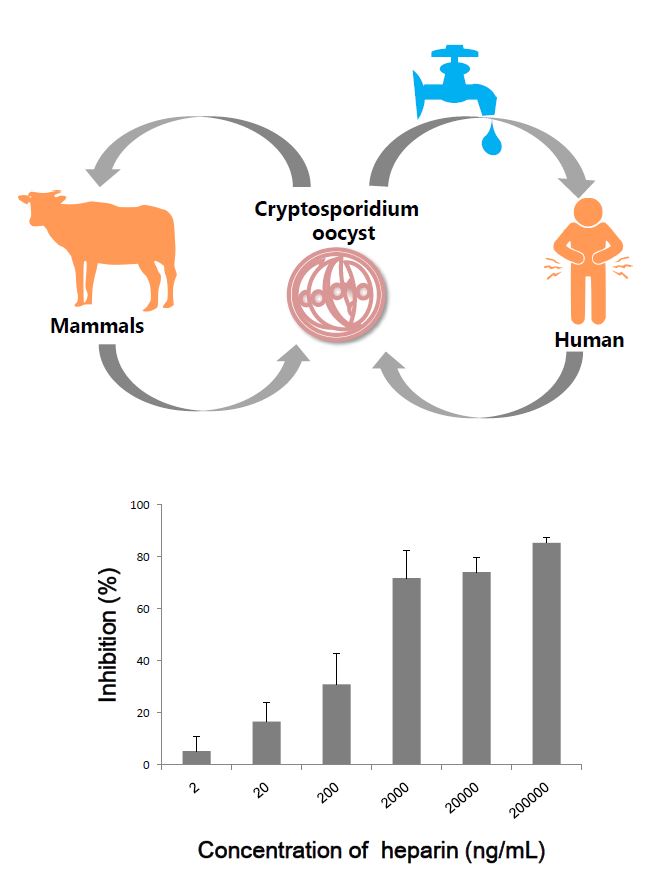Drug inhibits infection with cause of watery diarrhea Understanding mechanism of Cryptosporidium infection will support drug development


Life cycle of Cryptosporidium and inhibitory efficacy of heparin
(Upper) Life cycle of Cryptosporidium
(Bottom) Inhibitory efficacy of heparin on Cryptosporidium infection is concentration dependent (increases with concentration).
© 2015 Kentaro Kato.
Researchers at the University of Tokyo and Obihiro University of Agriculture and Veterinary Medicine have demonstrated that heparin, a type of sulfated polysaccharide, inhibits infection with Cryptosporidium parvum, a protozoan that causes diarrhea in humans and other mammals. This will facilitate the development of anti-cryptosporidial agents.
Cryptosporidium is zoonotic pathogen (a pathogen that causes disease in animals and which can also infect humans), which infects a wide range of mammals including humans and cattle causing severe diarrhea. The pathogen can cause outbreaks in humans through tap water because of its resistance to chlorination, and economic loss for farmers by infecting and causing severe diarrhea in young calves. Therefore, the livestock sector requires effective measures against the pathogen and investigation of the mechanism of infection and development of new medicines are urgently needed.
In this study, Associate Professor Kentaro Kato and his group at the University of Tokyo Graduate School of Agricultural and Life Sciences and Obihiro University of Agriculture and Veterinary Medicine investigated whether sulfated polysaccharides inhibit infection by the Cryptosporidium parasite using cells derived from human colon tissue. The group showed for the first time that heparin inhibits the infection of Cryptosporidium, and that the greater the concentration of heparin the greater the inhibitory effect. In addition, the group investigated the mechanism of infection by the Cryptosporidium parasite, and elucidated that heparan sulfate, a sulfated polysaccharide found on the surface of mammalian cells, is involved in Cryptosporidium infection.
“This study will further promote our understanding of the interaction of heparin sulfate with Cryptosporidium and the mechanism of Cryptosporidium infection, and will facilitate the development of anti-cryptosporidial agents,” says Associate Professor Kato.
Press release (Japanese)
Paper
, "Heparin interacts with elongation factor 1α of Cryptosporidium parvum and inhibits invasion", Scientific Reports Online Edition: 2015/7/1 (Japan time), doi: 10.1038/srep11599.
Article link (Publication)
Links
Graduate School of Agricultural and Life Sciences
Department of Veterinary Medicine, Graduate School of Agricultural and Life Sciences
Laboratory of Veterinary Microbiology, Graduate School of Agricultural and Life Sciences (Japanese)






